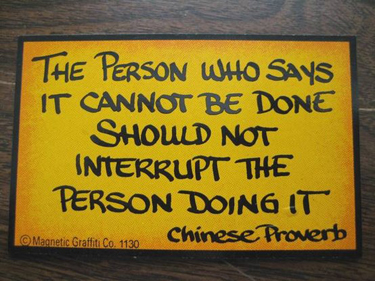
There is a Chinese proverb I’ve always liked, “The person who says it cannot be done should not interrupt the person doing it.”
Unfortunately, however, proverbs only go so far when others are busy second-guessing your ideas and initiatives with questions along the lines of “But what if X happens?” “But what if Y happens?”
Now it’s my hope that you will have thought through the answers to the majority of the hypothetical questions and scenarios you might face prior to your presentation and so, greet each one with poise. (Please note: at the very least you must think through the answers to the worst 3 questions you are going to be asked prior to every meeting.) Every now and then, however, it’s possible you will be presented with a “What if?” that’s so preposterous you have no rejoinder. In these moments, it can be helpful to have the following phrase in your arsenal:
“I think the better hypothetical question is X.”
The beauty of this particular response is that it
- flags the question as hypothetical
- acknowledges there is the germ of a good idea in the question, but
- moves the conversation in a direction that’s actually productive.
An alternate to the “What if? scenario, is one in which the questions being fired at you are more hostile. In these moments, I’ve found the following sentence useful:
“I’m not willing to speculate on hypotheticals.”
The reason this response works so well is
- your use of “willing” It’s not that you can’t speculate. It’s that you won’t
- your use of “speculate” Inherent in that is a reminder to those listening that the question being asked is merely speculative and, finally, (in case anyone is unclear)
- you’ve again flagged the hypothetical
I hope the above is helpful in silencing the naysayers so you can get back to doing what needs to be done.
Frances Cole Jones
